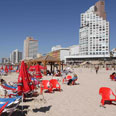
Tel Aviv: Zionism 101
Op-ed: Tel Aviv’s success both as a Jewish cultural mecca and global city must be applauded
It’s 8 am on Sunday morning, and another week in the congested streets and overflowing cafes of Tel Aviv has begun.
By midday, the beaches will be full of tourists, students and independently employed Tel Avivim who relish in the flexibility of being able to self-manage their own lives while taking in the hot Mediterranean sun and the sea’s glistening afternoon waters.
The city of Tel Aviv has come a long way since 1909 when the 66 founding families decided to push up north from Jaffa and replace the expansive sand dune-dominated topography with what would eventually become the fundamental trial of Jewish self-governance and contemporary Hebrew culture.
As the first and only modern Jewish metropolis, Tel Aviv was the original outfit for implementing Eliezer Ben Yehuda’s success in transforming the antiquated Hebrew of the Scriptures into the quasi-revolutionized language of Zionism and one of the indispensable foundations required for authentic self-determination among Jews in the land of their forbearers.
The “White City,” as Tel Aviv has come to be known, showed the world that Jews could construct a vibrant civil society from the ground up with all the elements that romanticize and, unfortunately, even plague today’s global cities.
Tel Aviv is the financial, economic, cultural, military and diplomatic epicenter of modern Israel. However, the glorification of Tel Aviv as epitomizing the ultimate experiment in Zionism cannot ignore the wealth of problems that encompass Tel Aviv today.
Just as the annual Pride Parade will flood the city’s streets in the coming weeks, hundreds will turn out to protest the astronomical growth in asylum seekers and foreign workers. And weekend outings on the beach will be complemented by massive demonstrations on Saturday evenings in hopes of reinvigorating and superseding last summer’s crusade for social justice.
Yet all these components and juxtaposed dynamics are part of life in all major “Westernized” cities. The question of how to effectively and morally deal with an influx of refugees is a natural progression within the development and economic opportunity found in urban centers.
Seeking a more financially secure future and greater equality among those with the means of production in their hands, via mass, unrepressed protests, should be part of any radiant democracy. Isn’t that what our neighbors are looking to achieve? Foreign policy aside, aren’t many protesting in the Arab world looking at Tel Aviv as an example for how they, too, should be allowed to express themselves?
‘Bubble Syndrome’
The “bubble syndrome” that is often ascribed to Tel Aviv might at times be a fair description regarding how certain individuals remain addicted to the convenience offered by metropolitan city living, while rarely feeling the need or even the desire to release themselves from those confines. However, being a “bubble” implies that Tel Aviv as a city in itself insulated and aloof in its relation to the rest of the country. This could not be more inaccurate.
To disparage Tel Aviv as nothing more than a suffocating bubble fails to recognize the international attractiveness as a premier city for the arts, entertainment, business and Mediterranean escapism - a Zionist experiment that reached across the globe and showed people that Jews can do what the French did in Paris, what the Turks did in Istanbul and what the Americans did in New York City.
So as much as Tel Avivim might be confined to their fast-paced, self-absorbed routines, their daily exposure to the international importance represented by their city actually deconstructs the bubble phenomena.
Rather than Tel Aviv being branded as the place where no one cares about what goes on in the rest of the country, it should be commended for the reprieve it provides to those wishing to feel like they live as part of the international community, and not just within the singular Israeli community.
While entitlements about the true guardians of Jerusalem are subjectively debated, and the legitimacy that certain groups have to that city continuously slandered, no one can deny the objective claims that Tel Aviv is uniquely the Jewish city and the greatest accomplishment within the evolving narrative of the modern Zionist experiment.
So this week, during which the “reunification” of Jerusalem is celebrated, and nearly one month after the aura of Independence Day has faded, Tel Aviv’s contribution to the Zionist psyche, and its success both as a Jewish cultural mecca and global city, must be equally celebrated and applauded.
Steve Rubin is an independent journalist and researcher in Tel Aviv. He holds an MA in Diplomacy from Tel Aviv University. Follow him on Twitter @TheRealRubin










